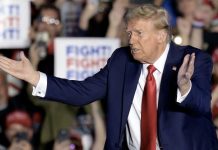
May 18 (UPI) — President Donald Trump said he “respects” the Justice Department’s decision to appoint a special counsel to handle its investigation into Russia’s election hacking, but called the effort a “witch hunt” designed to hurt his presidency.
Speaking at a joint press conference at the White House with Colombian President Juan Miguel Santos, Trump reiterated the phrase he used Thursday morning on Twitter and again denied his campaign colluded in Russia’s cyberattacks against Hillary Clinton and the Democrats during last year’s election.
“I respect the move but the entire thing has been a witch hunt. There has been no collusion,” Trump said.
In an atypical move for a sitting president, Trump publicly criticized a law enforcement matter decided by his own Justice Department, to appoint and independent investigator to take over the probe.
“With all of the illegal acts that took place in the Clinton campaign & Obama Administration, there was never a special counsel appointed!” Trump tweeted Thursday. “This is the single greatest witch hunt of a politician in American history!”
During the press conference Thursday afternoon, Trump also categorically denied media reports he asked former FBI Director James Comey to shut down an investigation into former national security adviser Michael Flynn, whose business ties to Russia have come under close scrutiny since Trump fired Flynn only weeks into his administration.
Asked if he pressured Comey to halt the Flynn probe, Trump said: “No, no. Next question.”
Trump fired Comey, who was leading the Justice Department’s Russia inquiry, last week. The move touched off a firestorm of criticism that intensified in the wake of subsequent reports Trump previously asked Comey during a private White House meeting to stop pursuing the Flynn matter.
While Trump issued stern denials, the focus of the political drama turned to Capitol Hill, where Deputy Attorney General Rod Rosenstein met with the full Senate in private to brief them on his decision to appoint Robert Mueller to serve as special counsel and take charge of the department’s Russia investigation.
Sen. Lindsey Graham, R-S.C., a critic of Trump’s inside the GOP, said the Rosenstein briefing led him to believe the nature of the Russia investigation had changed, from one examining how far Russia had meddled in the election to whether any U.S. citizens were part of the effort.
“It was a counterintelligence investigation before now. It appears to me now to be considered a criminal investigation,” Graham said.
Senators also asked Rosenstein about the administration’s decision to fire Comey. The White House cited a letter from Rosenstein to the president advocating for Comey’s dismissal over his handling of the investigation into Hillary Clinton’s private email server. But Trump later contradicted that explanation, saying he’d made up his mind to fire Comey well before Rosenstein’s recommendation arrived on his desk.
Sen. Dick Durbin, D-Ill., said after the meeting that Rosenstein had essentially confirmed Trump’s recounting. Durbin said Rosenstein told senators he wrote the letter giving justification for Comey’s firing knowing the plans were already in the works. He added he was not pressured by the White House to offer any justification, Durbin said.
The meeting came after a week of White House chaos in which Trump also was accused of divulging classified information during a White House visit by Russia’s foreign minister and ambassador to the United States. Leaders of the Senate judiciary and intelligence committees have requested FBI and White House records regarding the conversation between Trump and Comey, and Comey has received an invitation to address Congress and give his version of events.
Adding to the drama, Comey apparently kept exacting notes and memos describing his private meetings with Trump, evidence that could prove crucial if Mueller’s investigation determines there was an effort by the White House – or Trump himself – to obstruct Comey’s Russia investigation.





